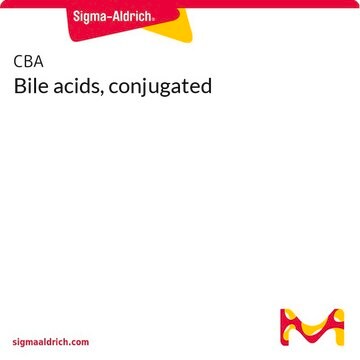C4650
Cholestyramine resin
Synonyme(s) :
Colestyramine, Dowex 1X2 Cl--Form
Se connecterpour consulter vos tarifs contractuels et ceux de votre entreprise/organisme
About This Item
Numéro CAS:
Numéro CE :
Numéro MDL:
Code UNSPSC :
23151817
Nomenclature NACRES :
NA.56
Produits recommandés
Forme
powder
Niveau de qualité
Technique(s)
activity assay: suitable
Matrice
polystyrene/divinylbenzene
pH
4—6
Capacité
~1.0 meq/g(dry)
Application
Cholestyramine resin has been used:
- as a diet supplement to study the bile acid pool size and fecal bile acid output in mice
- to alter the bile acid (BA) levels and study its effect on liver fibrosis development in wild type (WT), fibroblast growth factor 15 (Fgf15)−/−, and Fgf15 transgenic (TG) mice
- in in vitro digestion process to study the capacity of the fractions for binding bile acid (BA)
Cholestyramine resin is used in protein chromatography, ion exchange chromatography and anion exchange media. Cholestyramine has been used to study the relief of postcholecystectomy diarrhea, the management of intractable cholestatic pruritus and obesity.
Actions biochimiques/physiologiques
Cholestyramine is a cationic exchange resin polymer. This resin is a bile acid sequestrant that interchanges chloride anions for bile acids of the small intestine lumen, leading to excretion of bile acids in the feces and reduced levels of serum bile acid. Cholestyramine is used to treat primary hypercholesterolemia. The resin induces dose-dependent reduction of low-density lipid (LDL) cholesterol. It ameliorates the risk of coronary artery disease.
Autres remarques
Quartenary ammonium functional groups attached to cross-linked polystyrene
Informations légales
Code de la classe de stockage
11 - Combustible Solids
Classe de danger pour l'eau (WGK)
WGK 2
Point d'éclair (°F)
Not applicable
Point d'éclair (°C)
Not applicable
Équipement de protection individuelle
Eyeshields, Gloves, type N95 (US)
Certificats d'analyse (COA)
Recherchez un Certificats d'analyse (COA) en saisissant le numéro de lot du produit. Les numéros de lot figurent sur l'étiquette du produit après les mots "Lot" ou "Batch".
Déjà en possession de ce produit ?
Retrouvez la documentation relative aux produits que vous avez récemment achetés dans la Bibliothèque de documents.
Les clients ont également consulté
A R Bolier et al.
Acta gastro-enterologica Belgica, 75(4), 399-404 (2013-02-14)
Pruritus can be the dominant symptom of cholestatic liver disease but is difficult to treat since unraveling its pathophysiology is a great challenge. Serum autotaxin activity correlates with pruritus intensity, but its causal relationship, expression pattern and exact mode of
Robert W Crawford et al.
PLoS pathogens, 8(9), e1002918-e1002918 (2012-10-03)
Intestinal inflammation changes the luminal habitat for microbes through mechanisms that have not been fully resolved. We noticed that the FepE regulator of very long O-antigen chain assembly in the enteric pathogen Salmonella enterica serotype Typhimurium (S. Typhimurium) conferred a
Guillermo Rodríguez-Gutiérrez et al.
Journal of agricultural and food chemistry, 62(36), 8973-8981 (2014-08-21)
A process based on a steam explosion pretreatment and alkali solution post-treatment was applied to fractionate olive stones (whole and fragmented, without seeds) and olive cake into their main constitutive polymers of cellulose (C), hemicelluloses (H), and lignin (L) under
Guodong Li et al.
American journal of physiology. Gastrointestinal and liver physiology, 305(11), G829-G837 (2013-10-05)
Farnesoid X receptor (FXR, Nr1h4) is a ligand-activated transcription factor belonging to the nuclear receptor superfamily. FXR is essential in maintaining bile acid (BA) homeostasis, and FXR(-/-) mice develop cholestasis, inflammation, and spontaneous liver tumors. The signal transducer and activator
Noémie Péan et al.
Hepatology (Baltimore, Md.), 58(4), 1451-1460 (2013-05-21)
Many regulatory pathways are involved in liver regeneration after partial hepatectomy (PH) to initiate growth, protect liver cells, and sustain functions of the remnant liver. Bile acids (BAs), whose levels rise in the blood early after PH, stimulate both hepatocyte
Notre équipe de scientifiques dispose d'une expérience dans tous les secteurs de la recherche, notamment en sciences de la vie, science des matériaux, synthèse chimique, chromatographie, analyse et dans de nombreux autres domaines..
Contacter notre Service technique












